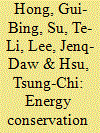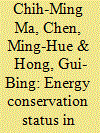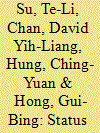| Srl | Item |
| 1 |
ID:
112272


|
|
|
|
|
| Publication |
2012.
|
| Summary/Abstract |
The pulp and paper industry is a significant consumer of fossil energy in the Taiwanese manufacturing sector. The concentration of greenhouse gases (GHG) from manufacturing factory activities and vehicle emissions has increased remarkably. Notable energy savings can be achieved in the pulp and paper industry through energy flow analysis. The aim of this paper is to analyze the energy flow for three major energy consuming mills of the pulp and paper industry in Taiwan to make energy savings. In addition, potential technology options are examined for the capture of some of the energy that is currently lost in the processes and to identify the areas of energy saving potential that could have a large impact across more than one industry. The results of this study can serve as a benchmark for developing a quantified list in terms of energy savings potential and opportunities for improving the efficiency of the pulp and paper industry.
|
|
|
|
|
|
|
|
|
|
|
|
|
|
|
|
| 2 |
ID:
099313


|
|
|
|
|
| Publication |
2010.
|
| Summary/Abstract |
Since Taiwan lacks sufficient self-produced energy, increasing energy efficiency and energy savings are essential aspects of Taiwan's energy policy. This work summarizes the energy savings implemented by 303 firms in Taiwan's textile industry from the on-line Energy Declaration System in 2008. It was found that the total implemented energy savings amounted to 46,074 ton of oil equivalent (TOE). The energy saving was equivalent to 94,614 MWh of electricity, 23,686 kl of fuel oil and 4887 ton of fuel coal. It represented a potential reduction of 143,669 ton in carbon dioxide emissions, equivalent to the annual carbon dioxide absorption capacity of a 3848 ha plantation forest. This study summarizes energy-saving measures for energy users and identifies the areas for making energy saving to provide an energy efficiency baseline.
|
|
|
|
|
|
|
|
|
|
|
|
|
|
|
|
| 3 |
ID:
116730


|
|
|
|
|
| Publication |
2012.
|
| Summary/Abstract |
The food industry in Taiwan is labor intensive, the cost of raw materials is high, and there is much product diversification. Although this industry is primarily small and medium scale, it is a large user of electricity in Taiwan's manufacturing sector. The concentration of greenhouse gases (GHGs) from manufacturing activities and vehicle emissions has increased remarkably. Energy audits are a basic and direct means by which energy efficiency can be improved, energy consumption reduced, and carbon dioxide emissions inhibited. This work summarizes the energy saving potential of 76 firms and the energy savings implemented by 23 firms as determined by energy audit tracking and from the on-line energy declaration system in Taiwan's food industry. The results of this study can serve as a benchmark for developing a quantified list in terms of potential energy savings and opportunities for improving the efficiency of the food industry.
|
|
|
|
|
|
|
|
|
|
|
|
|
|
|
|
| 4 |
ID:
124372


|
|
|
|
|
| Publication |
2013.
|
| Summary/Abstract |
The cement industry represents one of the most energy intensive sectors in Taiwan. Energy audits are the direct tools which are employed to help reduce energy consumption. The objectives of energy audits are to establish energy audit systems, provide on-site energy audit service and reduce production cost. This study summarized the energy savings implemented in Taiwan's cement industry; the data were obtained from the on-line Energy Declaration System in 2010. The total implemented energy savings amounted to 68,512 kilo liter of crude oil equivalent (KLOE). The energy audit group audited seven Taiwanese cement plants in 2011 and revealed an energy saving potential of 2571.6 MWh of electricity and 1002.8 KLOE of thermal energy. The total potential energy saving was 1708.5 KL of crude oil equivalent (KLOE), equivalent to a 4560 t reduction in CO2 emissions, representing the annual CO2 absorption capacity of a 122 ha forest plantation.
|
|
|
|
|
|
|
|
|
|
|
|
|
|
|
|